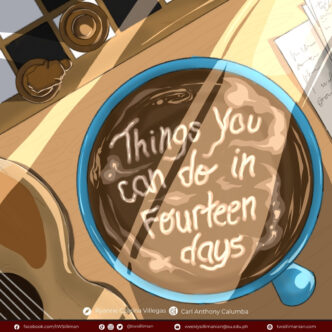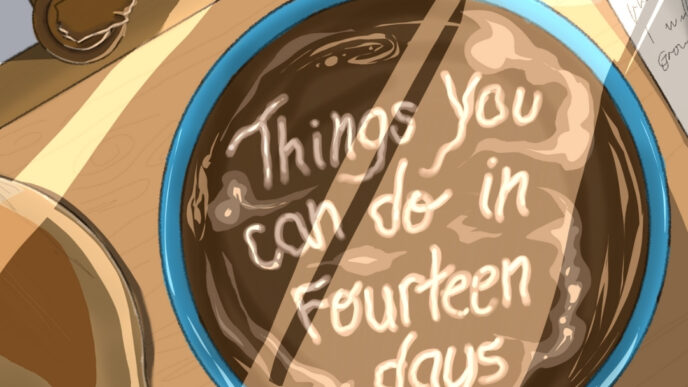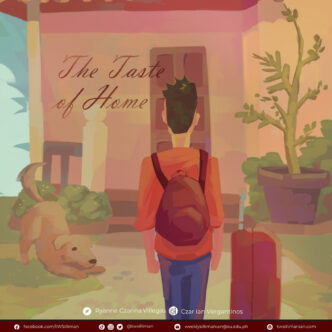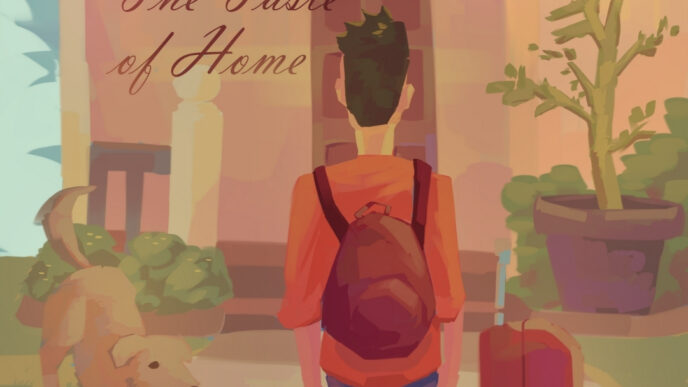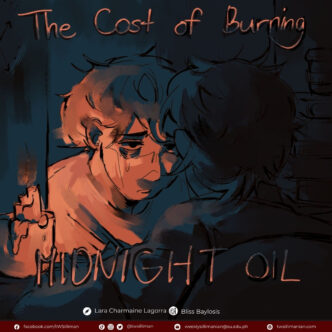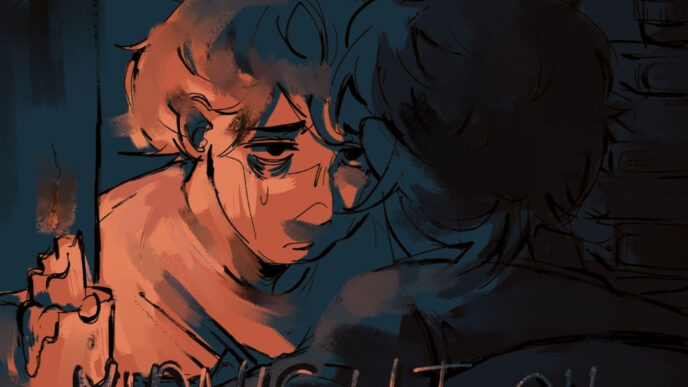By Ryanne Czarina Villegas
Taylor Swift has always been more than a pop star—she’s been a storyteller. For nearly two decades, she built her world out of words, crafting verses like diary entries whispered through melody. She had a way of making listeners feel like they were living inside her songs.
Her lyricism wasn’t just clever, it was confessional, poetic, intimate, like you could feel every bit of emotion she did when she wrote them. From the youthful nostalgia of “Fearless” to the complexity of “Red” and the introspection of “Folklore.” — it is clear that she has worn her heart in a dozen shades, each era stitched with its own kind of magic.
Even as her sound evolved, from country to pop to indie-folk, her essence remained. Sharp, emotional story-telling that blurs the lines between personal and universal. Maybe that’s why her latest album feels like such a shock. It’s not that it’s bad—it’s that it’s unfamiliar. It’s an album that doesn’t immediately feel like her. And maybe that’s what makes it so divisive.
Listening to “The Life of a Showgirl” feels like watching an artist trying to wrestle with her own reflection. It makes one wonder what her process was in making the album. It seems too self-referential and uncertain of what it wants to be. As it turns out, fans can’t help but be disappointed.
The first two tracks were fine, but nothing emotion-evoking or lasting. They set the stage, you could say, but not the mood. “The Fate of Ophelia” opens with the kind of cinematic ambition you’d expect from Taylor, yet it feels strangely hollow. It’s polished and theatrical, but emotionally distant, as if she’s just describing rather than feeling.
“Elizabeth Taylor” follows with what could have been a strong metaphor for fame, femininity, and reinvention, but instead it lands softly. The concept is vivid, and Taylor has always been good at borrowing historical or cultural references to add weight, but the imagery here doesn’t feel so profound. It’s pleasant, but not as memorable.
Now, “Opalite” is probably one of the album’s best songs. It’s shiny, catchy, lighter, more playful. The production feels more adventurous here. It’s one of the tracks you can imagine being on replay because it kicks in with a feel-good energy. It reminds you of Taylor’s earlier pop songs that leans into joy, and it almost feels a little nostalgic.
“Father Figure” feels ambitious and a bit divisive. Some lyrics feel like they’re trying too hard to be provocative, especially with double entendres. There’s also a tension between wanting to sound bold and still keeping things relatively safe. The production is elegant in parts, but compared with the simplicity of Taylor’s best emotion-heavy songs, this one just feels over-decorated.
The next track, one of the most anticipated ones, “Eldest Daughter” felt like a track that tried to dig inward but ended up awkward. The theme—of being the older sibling, of expectations, of public scrutiny—is promising. But some lyrics were jarring. References to memes, internet culture, certain lines feel out of place next to her more poetic moments. It’s vulnerable, but in its vulnerability, it sometimes feels less real.
The sixth track, “Ruin the Friendship,” is one that speaks of regret, longing, and high school memories. Taylor has done this well in the past, and here she does it fairly well. Vocals are more raw in places, the storytelling works. It might not be revolutionary, but it’s honest in a way that is missing elsewhere. It might be one of the tracks people come back to more than once.
“Actually Romantic” is where some of the tension in the album becomes more visible. On one hand, there’s that sass that some people enjoy. On the other hand, it also feels petty and mean. It’s not Taylor’s first time with this style, but it sure garnered a lot of raised eyebrows. Some will say it’s fun; others will say it’s distracting or off-tone.
“Wi$h Li$t” depicts the ambition in the world she paints—yearning for stability, domestic dreams, public image. But there are lines that have already sparked criticism because they read more like Instagram captions than poetry. The melody is fine, the production clean, but it doesn’t linger as much as it might have. It feels like what people complain about: “nice idea, but doesn’t quite stick.”
The next song, “Wood,” is one of the more controversial tracks, partly because of its sexual innuendos. Some listeners find it bold, while others find it a little too obvious, too unfamiliar, too on the nose. Musically, it has its moments, but the lyrical approach feels less nuanced. It’s new, but maybe not in a way everyone will admire.
“Cancelled!” is another one of the album’s controversial tracks. It’s supposed to sound catchy, witty, and sassy, but it just sounds shallow and uneven. As a concept, it makes sense, given the industry that she lives in. But as a song, it feels like it’s collapsing under its own weight.
The eleventh track, “Honey,” is a softer song. Pleasant, warm, but also one of the least memorable. It’s comforting, but not compelling. It lacks a hook that jumps out. If you want emotional resonance, this might be one of the safer, easier places on the album—but also the place you might skip most.
Lastly, the title track. “The Life of a Showgirl (feat. Sabrina Carpenter).” This track is surprisingly underwhelming—a strange note to end on for an album that promised spectacle. As the title track, and with one of the current biggest artists in the world featured, expectations were sky-high. Yet instead of a grand finale, Life of a Showgirl feels like a faint echo of what it could’ve been—polished, yes, but emotionally hollow.
The feature, while impressive on paper, adds little depth, blending into a song that seems more focused on appearances than impact. It’s not a bad track, but for a closer meant to define an era, it leaves you wondering if Taylor has grown too careful, too aware of her own spotlight.
Taylor’s lyricism, once her most defining strength, seems to have dimmed under the weight of self-consciousness. The sharp turns of phrase that once made her songs feel like private diary entries have given way to language that feels oddly simplified, sometimes even juvenile.
There’s a sense that she’s trying to meet the next generation halfway, speaking in the shorthand of Gen-Z pop rather than the winding narratives that built her empire. In doing so, she risks losing the very magic that made her distinct. Even the melodies, once instantly memorable, now feel hollow and fleeting. Gone are the anthemic choruses that lingered for weeks, and in their place are hooks that flicker and fade.
The comparisons to younger artists like Sabrina Carpenter and Olivia Rodrigo are almost inevitable. Their music feels effortless, spontaneous—unburdened by legacy. Swift, in contrast, sounds like she’s aware of her own myth, maybe even trying to rewrite it.
Is she trying to appear more relatable, more playful, more “of the moment”? Or is this simply what happens when a songwriter who grew up under a microscope tries to evolve while the world demands she stay the same?
Fans have even drawn parallels between the lover girl she was with Joe Alwyn and the lover girl she is with Travis Kelce. The shift is palpable. It’s not just in her lyrics—it’s in her tone, her delivery, her emotional disposition. The vulnerability that once felt natural now comes dressed in irony and literalness. One that fans don’t recognize.
“The Life of a Showgirl” is neither her worst nor her best. It’s something more complicated—an artist’s attempt to redefine what vulnerability looks like after years of translating her emotions to the public sphere. It earned mixed opinions because it was so unexpected for something so anticipated.
Some will call it distant, others will call it mature, and both might be right. The melodies may not haunt you like they used to, and the lyrics might miss the intimacy that once set her apart, but perhaps that’s the point. Maybe Taylor Swift isn’t writing for connection anymore—maybe she’s writing to close a chapter of her life to begin another.
But what about you? Regardless of whether or not you’re a fan of hers, what do you think of Taylor Swift’s latest album?







